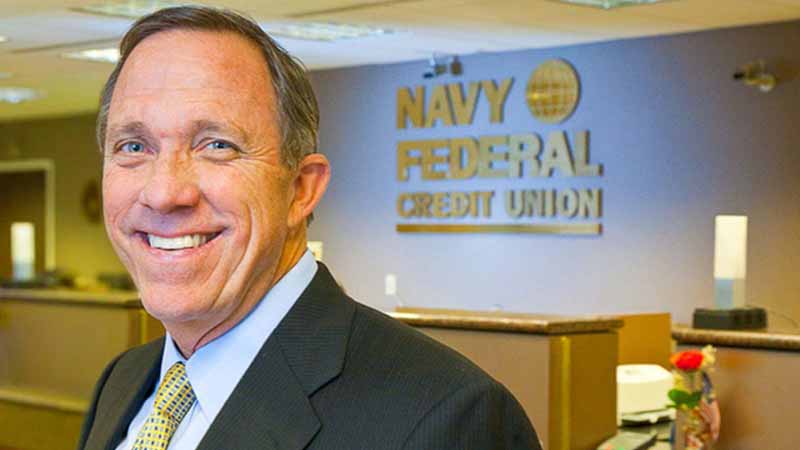Vice Admiral Cutler Dawson Captained Navy Federal Credit Union to Mega Success
The first thing Cutler Dawson did when he became CEO of the Navy Federal Credit Union (NFCU) in 2004 was make a commitment to "go to the deck plates," a term meaning that a ship's new commanding officer should visit even the most junior members of a crew to learn about them and what they did. He had recently retired with the rank of vice admiral after 34 years.
"When I arrived at Navy Federal, my first order of business was to let the employees know they were my highest priority," he wrote in "From the Sea to the C-Suite: Lessons Learned from the Bridge to the Corner Office" (with Taylor Baldwin Kiland, published by Naval Institute Press). "Some leaders put customers first, but if you take good care of your employees, they will take good care of your customers — or members, as we call them at Navy Federal."
From his first week to his last in January 2019, he visited branches, getting feedback directly from those on the front lines, a practice almost unheard of for top executives. "I used to tell commanding officers not to retreat to their cabins if they wanted to do their jobs right," he told Startup Savant. "The same applies to business, regardless of size — if you become disconnected from those who deal directly with the consumers of your products or services, you will be prone to failure."
What he learned resulted in big changes at NFCU during his 14 years at the helm, when it tripled its membership to more than 8 million and increased its branches to 335 while quadrupling its assets to over $100 billion, maintaining its status as the largest credit union in the world. Total loans increased fivefold to $76 billion, a rising number of which were for small businesses.
There had never been layoffs at Navy Federal, but he managed to not only keep that tradition even during the Great Recession, he oversaw an increase in employees during his time from 4,500 to 19,000. Positive word-of-mouth made it easy to recruit: in 2020, Fortune rated it yet again as one of the best companies to work for. At the same time, the American Consumer Satisfaction Index awarded it the highest rating.

Lessons From the Helm
Both Dawson's parents served in World War II. His mother was widowed when her first husband was killed in the Aleutian Islands at the war’s start, and she became one of the first WAVES (Women Accepted for Volunteer Emergency Services). She was stationed in Pensacola, Florida, where she met his father, a Navy pilot. After the war, they moved to Richmond, Virginia, where his dad worked for the IRS and Dawson grew up.
After attending the Naval Academy, Dawson entered a nuclear power training program, which had a 40% drop-out rate. Eventually, leaders realized that that was unsustainable, and they provided remedial math courses and whatever was needed. "The lesson for any organization is that you need to provide the right support for everyone, not just give up on them," Dawson explained.
Each Navy member has two specialties: a war-fighting one when he is at sea (in Dawson's case, serving as a surface warfare officer) and another when at a base (he earned his master's in financial management).
At 27, Dawson was given charge of his first vessel, the youngest of the commanding officers of the Navy's 550 ships. The USS Molala was an oceangoing tug with a crew of 85 that had served combat tours during World War II and off Vietnam. Now it was mostly assigned to track Soviet ships and aircraft at close range, and in 1976, they were shadowing a spy submarine off Southern California. He decided to boldly communicate directly with its CO and try to pick up some intelligence in the process. It worked.
"I quickly learned what the Navy practice of UNODIR really meant — making necessary vital decisions in the moment 'unless otherwise directed,' for which you are accountable," he said. "You have to combine bravery with humility, to be fearless and competitive when required, but grounded in what is realistic."
He also found that his sailors would do remarkable things, such as go into high-risk combat, if they believed he had the professional skills to lead, their best interests at heart, and he could inspire them to act as if they were part of the best ship in the Navy. "They all wanted to be winners and not let down their team," he explained.
He would go on to command five other ships and led a battle group of one carrier, six destroyers, a cruiser, 75 aircraft, and 7,500 sailors and Marines during Operation Desert Fox off Iraq in 1998. He ended his career as deputy chief of naval operations for resources, working out of the Pentagon.
Dawson joined Navy Federal in 1977, started serving as a volunteer advisor in the early 1990s because of his background in financial management, and then in 1996 was invited to join the board of directors. When he made his last visit to Fallujah, Iraq, to check on his sailors and Marines, he shared that he would be taking the reins at NFCU and was delighted when everyone was eager to share the great experiences as members.
Steering Through Turbulent Waters
Navy Federal was founded in 1933 to provide more accessible and discounted financial services for civilian members of the Navy Department in Washington, D.C. Credit unions are nonprofits serving a specific "field of membership," and NFCU gradually opened theirs to include naval officers anywhere, then enlisted personnel. By 1962, it was the world's largest, and in 1977, it moved into its current headquarters in Vienna, Virginia.
When Dawson assumed leadership, he began opening it up to active service members, reserves, and veterans in all branches, to Department of Defense contractors, and members of their households and extended families, from adopted children to grandparents. "The military has been operating as joint services since the 1980s, so there was no reason to restrict our membership, and Navy Federal is adding about a million members a year," he noted, now about 10% of the 110 million members of US credit unions.
But when Dawson first proposed opening to new groups, NFCU leaders told him it was impossible since they were doing a poor job of serving their current members. As he visited branches, he found long lines out the door, and it took 45 minutes to talk to someone at the call center — with 30% of callers giving up before anyone answered. It also took three days to approve an auto loan when an immediate decision was often required. The reluctance to invest in more personnel and infrastructure came from the Navy having to work within whatever budget it was given in order to avoid layoffs.
"Rather than looking at the expansion of the call center and adding branch staff as costs, I argued we should see these as opportunities to serve members better," he said. "After we had added more call center workers, the wait time dropped to an average of 47 seconds, and we not only opened many new branches, we made sure they were open at hours that fit the needs of local members. Car loans can now usually be approved in 10 minutes, and for those who don't have good credit scores, we can help them improve those. We also added greater ability to manage member finances online, which is critical for our widely dispersed membership."
Mary McDuffie, who worked closely with Dawson for his entire term at Navy Federal and succeeded him as CEO, proposed allowing call center staff to work from home when they ran out of office space in Pensacola. "I was skeptical about teleworking, but when the pandemic hit, we already had the system in place, and now employees can choose to work from home or come into the office," he said. "About 8,000 of our 20,000 workforce staffs the call center."
Dawson drew other lessons from his naval experience, noting that the Naval Construction Battalions (known as Seabees), who are often tasked to build under emergency conditions, have the motto, "Can Do!"
When there was resistance to advertising because "consumer unions don't sell, we just educate, and we would be reaching a lot of people who aren't eligible," he pointed out that the expansion of membership meant almost everyone knew someone who could qualify. NFCU's ads on "Monday Night Football" resulted in a big increase in calls about joining.
Above all, he promoted open, two-way communication and honesty between employees and managers, whether to discuss a good idea or deliver bad news. "Unfortunately, few leaders encourage that," he observed.
Everyone listened to members about how to improve service, even if it meant a reduction in revenue.
"When a new law in 2010 imposed a fee on credit and debit card transactions, we decided not to make members pay, but use this as an opportunity to grow by differentiating ourselves from other financial institutions, even though this would cost us $100 million a year," he noted.
Retired General Barry McCaffrey, who served four combat deployments, said that “From Sea to the C-Suite” was "the best leadership book [he had] ever read."
Serving Small Business
Banks criticize credit unions as unfairly competing because they do not pay taxes. "If they think we have the better business model, why don't they convert to become a credit union?" Dawson responded. "There is almost a bank on every corner, which gives them a big advantage, but they don't want to have to plow their profits back into member services and have unpaid board members. They would also be required to use only member deposits and not issue stock or raise outside capital."
Banks are notoriously unhelpful to small firms. The greater accessibility of business-savvy credit unions has made them an increasingly important alternative. While NFCU has specialized mostly in auto and mortgage loans, it does have a Small Business Solutions division.
"The typical member who can benefit is, say, a veteran who is just out and has an idea for a startup that requires buying several trucks," he noted. "We can help with financing and advice on the business plan."
If you are contemplating starting a company or expanding a small business, you should consider the advantages of joining a credit union.
About the Author

Scott S. Smith has had over 2,000 articles and interviews published in nearly 200 media, including Los Angeles Magazine, American Airlines’ American Way, and Investor’s Business Daily. His interview subjects have included Bill Gates, Richard Branson, Meg Whitman, Reed Hastings, Howard Schultz, Larry Ellison, Kathy Ireland, and Quincy Jones.
Startup Resources
- Learn more about Startups
- Visit the TRUiC Business Name Generator
- Check out the TRUiC Logo Maker
- Read our Business Formation Services Review
- Find Startup Ideas
- Explore Business Resources
Form Your Startup
Ready to formally establish your startup? Click below to read our review of the best business formation services!
Best Business Formation Services